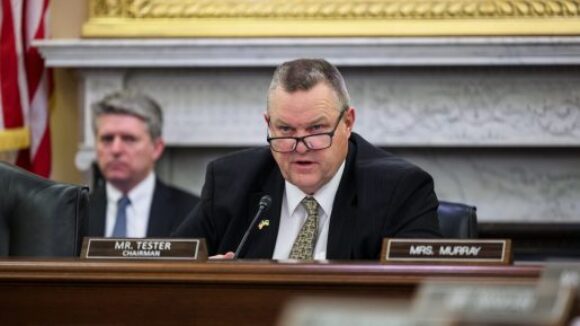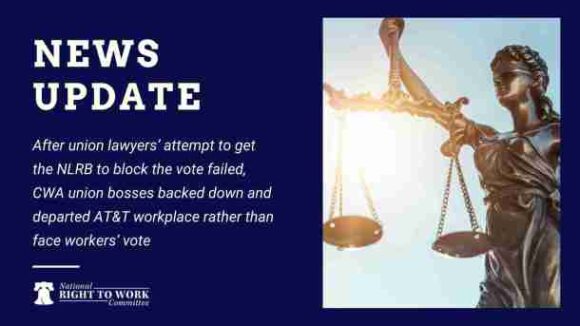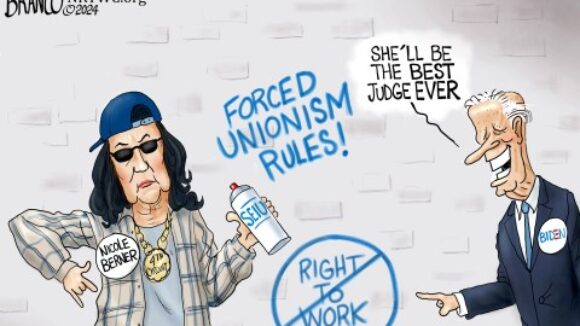The Washington Examiner has weighed in on tainted Big Labor contributions to congressmen pushing the Card Check Forced-Unionism Bill:
Seventeen congressmen representing both political parties who are sponsors of organized labor’s top legislative priority for 2009 refuse to say if they will keep contributions from unions with significant internal corruption problems.
The 17 senators and representatives come from nine states and received contributions totaling more than $359,000 during the 2006 and 2008 congressional elections from political action committees (PACs) funded by five major labor unions.
Among the five unions, there were a total of 71 convictions in federal courts since 2001 of felonies ranging from embezzlement and mail fraud to falsifying official reports to government and conspiracy.
Among those convicted were division presidents, vice presidents, secretary-treasurers and business managers. The amounts for the embezzlement convictions were from $5,000 to more than $100,000.
The five unions include the Communications Workers of America, the Boilermakers Union, the International Brotherhood of Electrical Workers, American Federation of Government Employees, the Paper, Allied-Industrial and Chemical Energy Workers International Union (PACE), now part of United Steel Worker of America (USW), and Service Employees International Union (SEIU).
Each of the 17 congressmen contacted by The Examiner declined to discuss the contributions or whether they plan to return the money after learning of the convictions.
Among the 17 from the House of Representatives are: Rep. Joe Baca, D-CA, Rep. Steven LaTourette, R-OH, Rep. James McGovern, D-MA, Rep. Barney Frank, D-MA, Rep. Frank LoBiondi, R-NJ, Rep. Jason Altmire, D-PA, Rep. Dennis Kucinich, D-OH, Rep. Pete Stark , D-CA, Rep. Hilda Solis, D-CA, who is now Secretary of Labor in President Barack Obama’s cabinet, Rep. Chris Smith, R-NJ, and Rep. George Miller, D-CA.
Those from the Senate include: Sen. Jay Rockefeller, D-WV, Sen. Barbara Boxer, D-CA, Sen. Barbara Mikulski, D-MD, Sen. Frank Lautenberg, D-NJ, Sen. Dick Durbin, D-IL, and Sen. Tom Udall, D-NM.
The 17 congressmen are co-sponsors of the Employee Free Choice Act, a controversial bill also known as “Card Check” that would abolish the secret ballot for employees voting in workplace representation elections.
Labor officials say Card Check would help them reverse the decline of the percentage of private sector workers belonging to unions from the post-war high in 1954 of 28.3 percent to seven percent today.
Opponents claim the bill would expose workers to intimidation from union bullies and force employees to accept unions who don’t want them.
It seems the congressmen have “refused to discuss the contributions,” which doesn’t surprise political observers contacted by The Examiner:
“They don’t want to return your calls because they don’t want to draw attention to their connections to corrupt institutions and they might have to give the money back,” said Mike Franc, vice-president for government relations at the Heritage Foundation.
“Their judgment might be called into question and their constituents might start paying attention to the connection between corrupt institutions on the one hand and their behavior on Capitol Hill,” he said. Before joining Heritage, Franc was communications director for then-House Majority Leader Dick Armey, R-TX.
Even though what to do about the money now is up for debate, “long-time” investigative journalist Bill Allison, a senior fellow with The Sunlight Foundation, “supports investigations of tainted political contributions and believes unions are a good place to start looking.”
“Unions don’t nearly get the kind of scrutiny that other donors do,” Allison said.
SEIU is particularly worthy of examination, Allison said, noting a federal investigation of alleged financial ties between the union former Democratic Illinois Governor Rod Blagojevich.
In the most recent election cycle, SEIU spent over $42 million on independent expenditures and communications, more than any other group aside from the Republican and Democratic National Committees, according to OpenSecrets.org.
During a recent conference on labor issues hosted by the Capital Research Center, Ivan Osorio, an economics analyst with the Competitive Enterprise Institute (CEI), pointed to SEIU as the primary driving force behind Card Check.
Congressional supporters of the bill in 2007 had collected throughout their careers on average $862,056 from union PACS, 10 times more than was received on average by opponents, according to data compiled by OpenSecrets.org.


